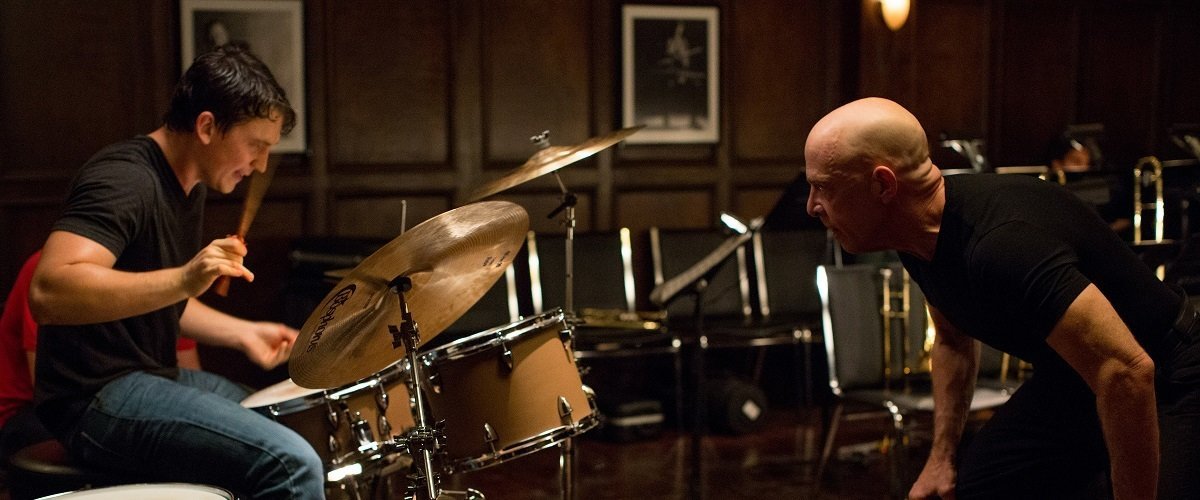
Directed by: Damien Chazelle
Starring: Miles Teller, JK Simmons, Melissa Benoist, Paul Reiser
Whiplash's general plot outline is similar to The Paper Chase (1973). A first year student is in awe and fear of his tyrannical teacher. While John Houseman's Professor Kingsfield's reign of terror consisted mostly of verbal putdowns, Whiplash's Terence Fletcher (Simmons) combines verbal abuse, colorful name calling, threats, and even occasional slapping of students in order to push his students to "greatness". His definition of greatness is measured by the brief life of Charlie "Bird" Parker, who according to Fletcher had a cymbal thrown at him in order to "inspire" him. Parker died at 34 of a drug overdose, but that's of little consequence to Fletcher. At least we squeezed every ounce of greatness from him before he died (my tone there is sarcastic).
Both Houseman and Simmons won Academy Awards for Best Supporting Actor for their respective performances. The role of a teacher who rules his students through fear and constant verbal beatdowns is a juicy one. Simmons clearly sinks his teeth in and creates a memorable presence even when he is not on screen. We sense Simmons' love for music borders on obsession. He hears whether a drummer is "rushing" or "dragging" and takes drastic measures to make a student recognize it. This includes throwing the cymbal. His rationale for his extreme methods lies in his quest to discover the next Charlie Parker. "The two worst words you can ever say to someone is 'good job'," he tells the drummer Andrew Neyman (Teller), who finds he is in way over his head in dealing with the likes of Fletcher.
Neyman never expected to deal with the extreme Fletcher when he first meets him while practicing at Schaffer Music Conservatory in New York. Fletcher invites him to play with the main band. At first, he engages Andrew in an encouraging pep talk. After a few minutes of playing, Fletcher is slapping Andrew repeatedly in the face demanding to know the difference between rushing and dragging. Andrew is fearful of Fletcher and practices harder either to impress him or keep him off his back. He pounds the drums until his hands are a bloody pulp. Does this keep Fletcher at bay? Hardly.
The relationship between Andrew and Fletcher is at the heart of Whiplash. The motives of both men become clear as the film moves on, or do they? Fletcher is way ahead of Andrew in the art of psychological manipulation, but by the end we are surprised to see Andrew may be capable of turning the tables. Teller projects naivete and eagerness in early scenes, followed by coldness as he dumps his girlfriend (Benoist), then a surprising toughness. He tells her he can't date her because he is focusing all of his energy on being a great drummer. Is sacrificing his personal relationships a way of achieving the elusive greatness that Fletcher talks about? He is close to his father Jim (Reiser), a teacher at a local high school who dreamed of becoming a writer. Is Jim the antithesis of the greatness Fletcher demands of his students? It is not beneath Fletcher to exploit this possibility when he rants against Andrew not being able to keep up with swing time.
Whiplash does not tell a new story, but does tell it with freshness and complexity. In the closing scenes, as Andrew bashes away on his drum kit in an impromptu drum solo, both he and Fletcher both achieve what they want on some level. We also have to question: How much do the ends justify the means as Fletcher finds perhaps the next Charlie Parker? At what cost are we willing to stretch to be great at anything? Are we even willing to be degraded to one day be called great?
No comments:
Post a Comment